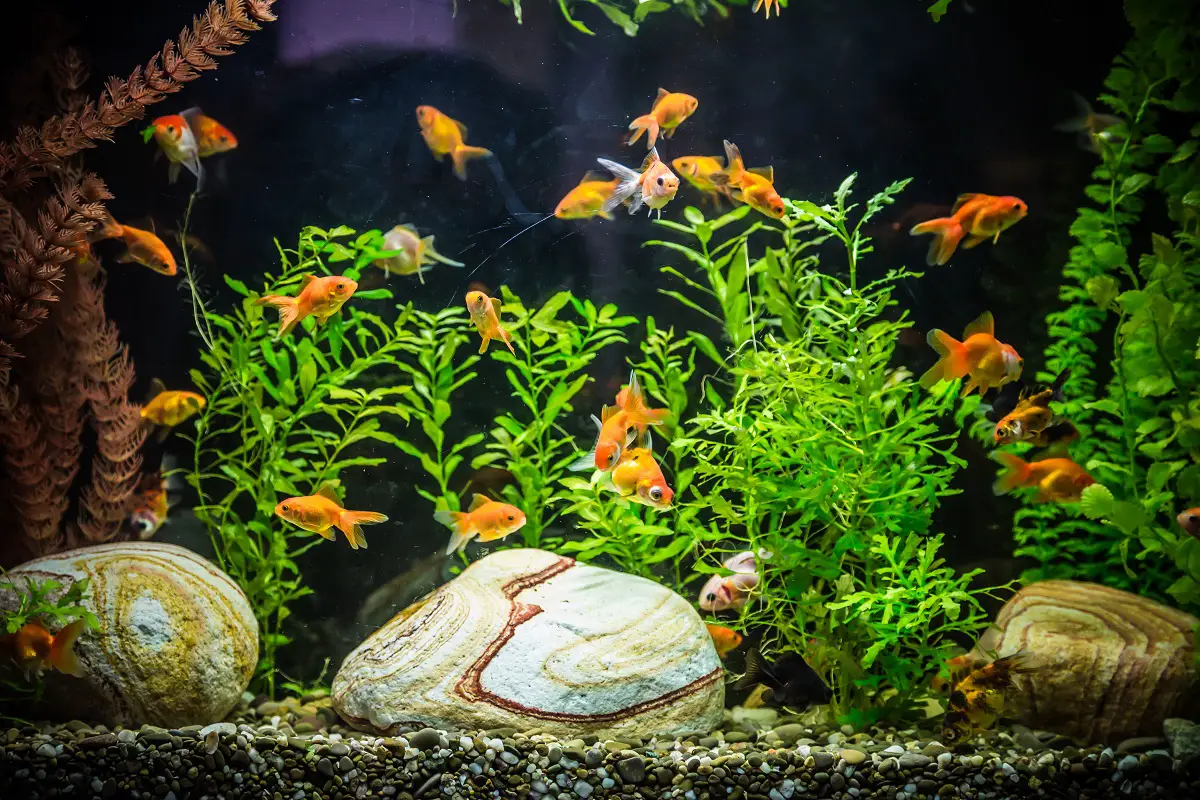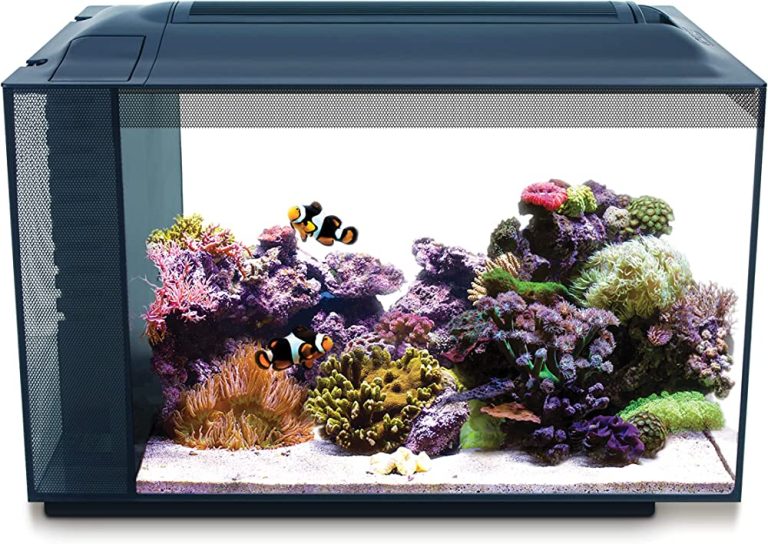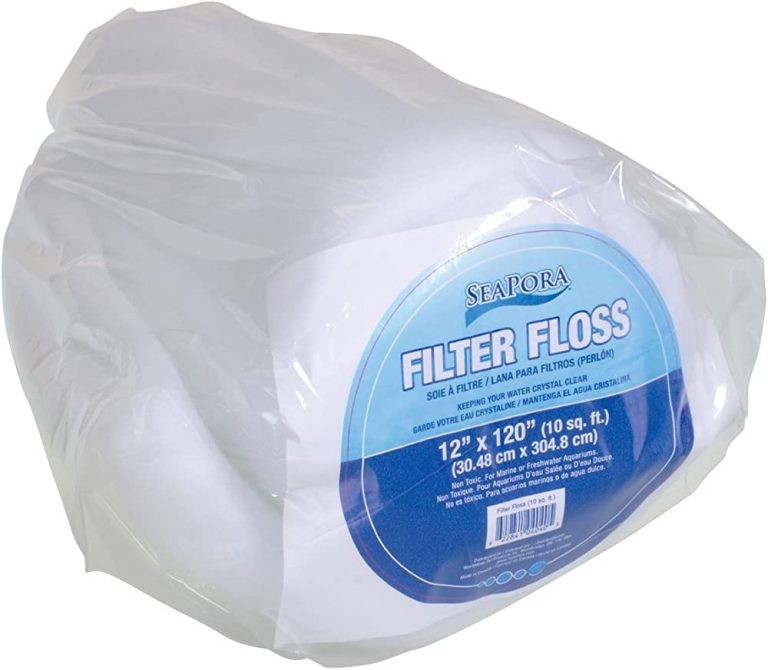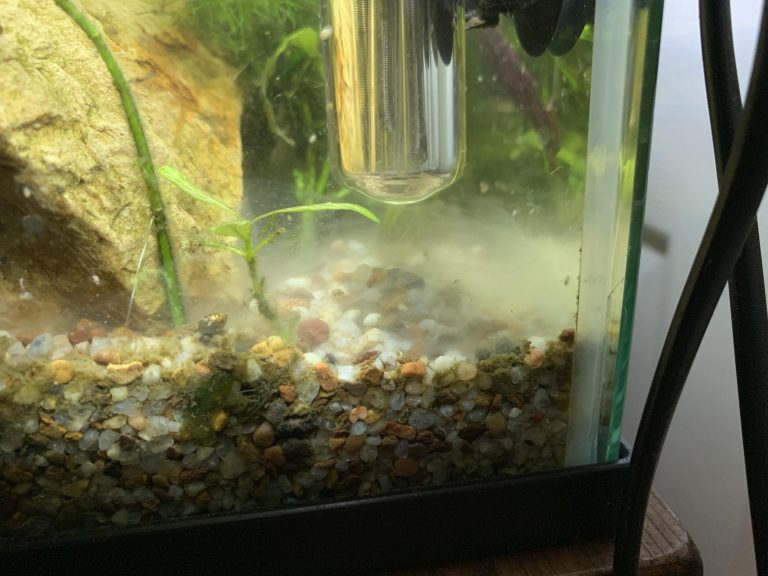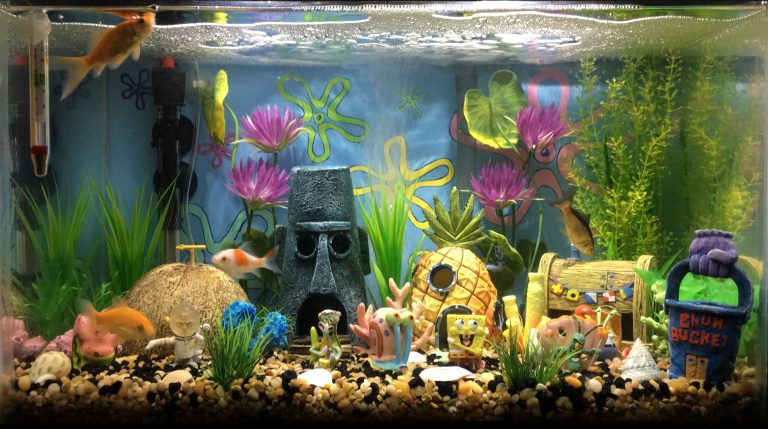Beginner’s Guide: Starting a Freshwater Aquarium like a Pro
Starting a freshwater aquarium requires proper research and planning. Creating a suitable environment for your fish will ensure their health and longevity.
Aquariums are a beautiful and rewarding addition to any home. They provide a relaxing and serene atmosphere for both the fish and the owner. Starting a freshwater aquarium may seem overwhelming at first, but with careful research and planning, anyone can successfully create their own aquatic ecosystem.
The first step is to decide on the type of aquarium you want to create, whether it be a community tank or a species-specific tank. Choosing the appropriate tank size, filtration system, lighting, and substrate is crucial for the health and well-being of your fish. With a little patience and dedication, you can enjoy the beauty of your very own freshwater aquarium.

Credit: www.shrimpscience.com
Understanding The Basics Of Freshwater Aquariums
Starting A Freshwater Aquarium
Freshwater aquariums are a wonderful addition to any home or office space, providing a relaxing and beautiful aquatic environment to enjoy. If you are considering starting a freshwater aquarium, there are several basics you need to consider before getting started.
We will guide you through the essential elements you need to know to successfully begin your freshwater aquarium journey.
What Is A Freshwater Aquarium?
A freshwater aquarium is an enclosed tank or aquarium that houses various aquatic creatures, including fish, plants, and invertebrates. Freshwater aquariums can come in a range of sizes, from small fishbowls to large tanks, and are designed to mimic natural aquatic environments.
These aquariums can be a simple setup for just a few freshwater fish or as complex as a fully planted tank with various species.
The Benefits Of A Freshwater Aquarium
There are many benefits of owning a freshwater aquarium, some of which include:
- Reducing stress and anxiety levels: Studies have shown that watching fish in an aquarium can reduce stress, anxiety, and even lower blood pressure.
- Promoting relaxation: Freshwater aquariums can create a calming and relaxing atmosphere in any setting, helping to promote a sense of relaxation.
- Enhancing productivity: Freshwater aquariums can help improve focus and productivity levels.
- Teaching responsibility: Keeping a freshwater aquarium can teach children and adults alike about the importance of caring for living creatures, helping to promote a sense of responsibility and care.
What Should You Consider Before Starting A Freshwater Aquarium?
Before starting a freshwater aquarium, consider the following:
- Budget: Depending on the size of the aquarium you want and the equipment required, setting up a freshwater aquarium can be expensive. Be sure to factor in all necessary expenses before making a purchase.
- Tank size: The size of the aquarium you choose will dictate how many and what type of fish you can keep.
- Equipment: You’ll need to buy a filter, heater, lighting, and substrate for your aquarium and ensure they are suitable for the type of fish you plan to keep.
- Fish species: The type of fish you select will depend on your tank size and what environment you want to create. Certain fish species will have different requirements in terms of water temperature, ph, and feeding habits.
- Maintenance: Freshwater aquariums require regular maintenance to ensure the health and wellbeing of your aquatic inhabitants. Decide how much time and effort you can commit to before investing in a freshwater aquarium.
Beginner Mistakes To Avoid When Starting A Freshwater Aquarium
Starting a freshwater aquarium can be a learning process, and there are many beginner mistakes to avoid. Some of these include:
- Overcrowding: Overfilling your tank with too many fish or too many plants can put a strain on your aquarium’s ecosystem.
- Not cycling your tank: Cycling your tank before adding fish is essential to establishing a healthy environment for your aquatic inhabitants.
- Not understanding the needs of your fish: Researching the specific requirements of the fish you plan to keep is essential. Not all fish will thrive in each other’s company and have different environmental needs.
- Not performing regular water changes: Regular water changes are essential to maintaining a healthy aquarium. Ensure to follow the recommended maintenance requirements of your tank.
By understanding the basics of freshwater aquariums and ensuring you have the right information, you can create a stunning and low-maintenance aquarium that provides a peaceful escape and enhances the atmosphere of any space.
Designing Your Freshwater Aquarium
Creating a freshwater aquarium is an excellent way to bring life and beauty into your home. A well-designed aquarium can provide an eye-catching focal point for any room, but it also requires careful planning and attention to detail. Here are some essential things to consider as you design your freshwater aquarium.
Choosing The Right Equipment For Your Freshwater Aquarium
Choosing the right equipment is essential for creating a successful freshwater aquarium. Here are some factors to consider when selecting equipment:
- Size of the tank: Before buying any equipment, you need to determine the size of your tank. The equipment requirements for a large aquarium are different from those for a small aquarium.
- Water quality: To keep your fish healthy and happy, it’s essential to maintain the water quality. A good filtration system can help maintain the right water quality.
- Types of fish: Different fish species have different equipment requirements. You need to choose your equipment based on the type of fish you plan to keep.
Filtration Systems And Their Importance In A Freshwater Aquarium
An essential component of a freshwater aquarium is a filtration system. A good filtration system will help maintain the water quality, remove toxins, and keep the aquarium clean. Here are some types of filtration systems and their importance:
- Mechanical filtration: It removes debris and waste from the water. It is essential to keep the water clean for fish.
- Biological filtration: It breaks down toxic waste products into less toxic substances. It is critical to maintain the water quality and keep the fish healthy.
- Chemical filtration: It removes impurities, chemicals, and odors from the water. It is essential to maintain the water quality and keep the fish healthy.
Lighting And Heating Requirements For A Freshwater Aquarium
The lighting and heating requirements for a freshwater aquarium are essential for maintaining a healthy environment for fish. Here are some critical things to consider:
- Lighting: Fish require the right amount of light to thrive and grow. The lighting also highlights the aquarium’s beauty and enhances the overall look of the tank.
- Heating: Fish are sensitive to temperature changes. Therefore, it is crucial to maintain a consistent temperature in the aquarium. A heater can help maintain the right temperature.
If you want to create a beautiful freshwater aquarium, you need to choose the right equipment, maintain water quality, and take care of the lighting and heating requirements. By following these tips, you can create an aquarium that is not only aesthetically pleasing but also safe and comfortable for your fish.
Selecting The Ideal Fish And Plants For Your Freshwater Aquarium
Starting a freshwater aquarium – selecting the ideal fish and plants for your freshwater aquarium
Looking to start a freshwater aquarium? Then you’re in for an exciting and rewarding hobby. Not only will a freshwater aquarium liven up your home or office, but you’ll learn about aquatic life and their ecosystems, and provide a home for fish and plants.
Choosing The Right Type Of Fish For Your Freshwater Aquarium
Choosing the right fish for your freshwater aquarium is critical. When selecting fish, it’s important to consider their size, living habits, and compatibility with other fish and plants. To help you get started, here are some key points to keep in mind:
- Consider the size of your aquarium. Larger aquariums can hold more fish and larger fish breeds.
- Research the habitat of the fish you’re interested in. Do they prefer open water or hiding places? Do they like a lot of plants or no plants at all?
- Be mindful of the fish’s compatibility with your other fish and plants. Some fish are notorious for being aggressive towards others.
- Choose freshwater fish breeds that are well suited for beginners, such as the neon tetra or the dwarf gourami.
How To Ensure The Health And Well-Being Of Your Fish
Once you’ve selected the ideal fish for your freshwater aquarium, it’s essential to ensure their longevity and well-being. Fish are sensitive creatures and require a specific environment to prosper. Here are some tips to help keep your fish healthy:
- Monitor the temperature and ph levels in your aquarium with an accurate thermometer and test kit.
- Feed your fish the appropriate diet. Overfeeding can lead to dangerous water conditions.
- Perform regular water changes to keep the water clean and prevent the accumulation of toxins.
- Keep an eye out for signs of illness, such as lack of appetite, discoloration, or erratic swimming.
Understanding The Different Types Of Freshwater Aquarium Plants
Aquarium plants aren’t just a pretty addition to your freshwater aquarium; they’re also essential to the health of your fish and aquarium ecosystem. However, the types of plants you can choose from can be overwhelming. Here’s what you need to know about freshwater aquarium plants:
- There are two types of freshwater aquarium plants: Live and artificial.
- Live plants provide fish with oxygen, absorb nitrates that can harm fish, and compete with algae.
- Artificial plants are low maintenance, but they don’t provide the same benefits as live plants.
- Research the plants you’re interested in to ensure they’re compatible with your fish and aquarium conditions.
Planting And Arranging Your Freshwater Aquarium
Once you’ve chosen the ideal fish and plants for your freshwater aquarium, it’s time to plant and arrange them in a pleasing way. Here are some key points to consider:
- Start with a layer of substrate at the bottom of the aquarium. Inert substrates such as sand or gravel are suitable for most freshwater aquariums.
- Place larger plants in the background and smaller ones in the foreground.
- Create a balanced look by placing plants on both sides of the aquarium.
- Create hiding places for your fish by placing plants and decorations in different areas of the aquarium.
By following these tips, you can help ensure the success of your freshwater aquarium. Remember, with the right mix of fish and plants, you’ll create a thriving ecosystem that will bring joy and wonder for years to come.
Essential Maintenance, Water Changes, And Health-Checks
Starting A Freshwater Aquarium: Essential Maintenance, Water Changes, And Health-Checks
A freshwater aquarium is an amazing addition to your home. It offers a relaxing atmosphere and gives you the opportunity to learn about the aquatic world. However, it is a responsibility that requires consistent maintenance and monitoring. In this section, we’ll discuss essential maintenance, water changes, and health checks to ensure your aquarium stays healthy and beautiful.
The Importance Of Regular Maintenance In A Freshwater Aquarium
Like any pet, fish need proper care and regular attention. Regular maintenance helps keep the water clear and healthy, avoids toxins or harmful chemical build-up, and lowers the risk of fish illness.
Here are some maintenance tips:
- Check the water temperature and adjust it accordingly.
- Test the water ph, ammonia, nitrite, and nitrate levels weekly.
- Remove excess food and debris using a net or siphon.
- Clean the filter according to the manufacturer’s instructions.
- Regularly clean the tank and decorations to eliminate algae and bacteria.
Tips For Maintaining Healthy Water Conditions
Maintaining healthy water conditions is critical for the longevity and well-being of your fish.
Here are some tips to ensure healthy water conditions:
- Ensure the water temperature stays steady.
- Keep the aquarium clean.
- Avoid over-feeding the fish.
- Do not overstock the aquarium.
- Do not change the water temperature or its ph quickly.
- Introduce new fish slowly and gradually.
Essential Tools And Equipment For Freshwater Aquarium Maintenance
Having the proper tools and equipment will make maintaining your aquarium more manageable.
You will need:
- A thermometer to monitor the temperature.
- A water testing kit.
- An aquarium net for removing debris and dead fish.
- A siphon for performing water changes.
- A scraper or brush to remove algae from the glass, decorations, and gravel.
- A filter to clean and circulate the water.
How To Perform A Water Change In A Freshwater Aquarium
Regular water changes are essential for a healthy aquarium. You should aim to change 10-20% of the water every two weeks.
Here are the steps to perform a water change:
- Turn off all aquarium equipment.
- Use a siphon to remove the water from the aquarium.
- Use a scraper or brush to clean the glass, decorations, and gravel.
- Treat new water with a water conditioner to remove impurities.
- Refill the tank with new water.
- Turn on the aquarium equipment and wait for the water temperature to stabilize.
By following these simple maintenance directives, you can ensure a healthy and attractive aquarium for years to come. Remember, healthy fish are happy fish!
Frequently Asked Questions For Starting A Freshwater Aquarium
What Is The Ideal Tank Size For Beginners?
A 20-gallon tank is a good starting point for beginners. It provides enough space to house a manageable number of fish and plants.
How Often Should I Change The Water In My Aquarium?
It is recommended to change 10-20% of the water in your aquarium every week. This helps to maintain a healthy environment for your fish.
Do I Need To Add Chlorine Remover To The Water?
Yes, chlorine is harmful to fish. Add chlorine remover to tap water before adding it to the aquarium to ensure the water is safe for your fish.
What Type Of Filter Should I Use For My Aquarium?
There are three types of filters: undergravel, hang-on-back, and canister. Hang-on-back filters are a good choice for beginners. They are easy to use and maintain.
Conclusion
As a beginner, starting a freshwater aquarium can be a daunting task but with proper research and guidance, it can become a rewarding experience. It’s important to have a clear idea of the type of fish and plants you want to keep and ensure that they are compatible with each other.
Understanding and maintaining proper water chemistry, including temperature, ph level, and ammonia/nitrate levels is crucial for the health and well-being of your aquatic pets. Adequate filtration and regular water changes are also key components of a healthy freshwater aquarium. Don’t forget to decorate your aquarium with natural-looking substrates, driftwood, rocks, and plants to create a beautiful and welcoming environment.
With patience and care, your freshwater aquarium can become a source of joy and relaxation for years to come. Happy fish keeping!
